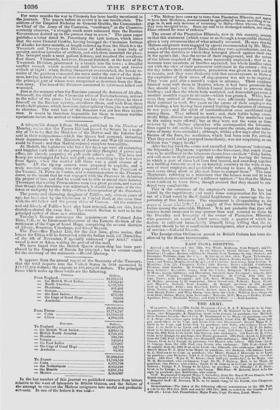In the last number of this journal we published extracts
from letters relative to the want of labourers in British Guiana, and the failure of the attempt to convert the Maltese emigrants into useful and profitable servants. In one of the letters it was said— "The Maltese have come up to town from Plantation Hibernia, and appear to have been ill-chosen, unaccustomed to agricultural labour, unwilling to en. gage . in it, and only desirous of returning to Malta—from whence, they s
w m ay
they were inveigled away. Saute are said be discharged soldiers, and °flax;
felons released for want of evidence."
The owner of the Plantation Hibernia, now in this country, assarés". us that this statement (which came to us through a respectable channef). gives a very erroneous idea of what actually occurred. He says that the Maltese emigrants were engaged by agents recommended by Mr. Mitro- vich, a svell-known patriot of Malta; that they were agriculturists, and the names of the districts to which they belonged placed against their own in the agent's list ; that the terms of their engagement, and the nature, of the labour required of them, were repeatedly explained; that in no instance were members of families separated, but whole families taken out with the view of their permanent settlement in the colony ; that on the day before their embarkation, permission was given to each and all to remain, and they were distinctly told that reconveyance to Malta at the expiration of their terms of eugagement was not to be expected. They were paid also a month's wages in advance. Their employer himself went with them to Madeira, where it had been promised that they should land ; lint the British Consul interfered to prevent their landing; and then the whole body mutinied, and-demanded payment of another month's vages in advance—which was granted. When, how- ever, they arrived at Demerara, they were officiously informed that their contract to work five years on the estate of their employer Was not binding, a law having been passed limiting the duration of contracts to one year ; and the spirit of insubordination semi manifested itself among them. They refitsed to work ; and, their habits being exces- sively filthy, disease soon appeared among them. The medicines used in the colony were offered; but as they were not the same as those ordered by the Maltese physician who accompanied the labourers, fines equal to 42/. sterling were imposed upon the estate, and the inden- tures of many were cancelled ; although, within a few days after the iii- fiction of the fines, the medicines, which had been sent for, arrived. That they could not be procured immediately, was not surprising, as one of them was " puppy broth!" After having fined the estate and cancelled the labourers' indentures, the Stipendiary Magistrate reported to the Governor, that much bhuue was to be attributed to the labourers themselves—to their "filthy habits, and still more to their perversity and obstinacy in leaving the houses in which a part of them had been first located, and crowding together in a building formerly used as an hospital, contrary to the wish or con- sent of their employer, and po4tively refusing to leave it,, although I used every thing short of' physical force to compel them." The sonic Magistrate, referring to a statement that the houses were not fit to be inhabited, declares himself of " a different opinion ; " but that the Maltese were resolved to leave them, though assured that they should be ren- dered very comfortable.
This is the substance of the employer's statement. He has lost 1,600/. by the experiment ; and seeks some compensation for his lose out of a fund voted by the Colonial Legislature to encourage the im- portation of free labourers. The experiment is disappointing to the
mita .";f. ,,, a Supply of free labourers for the Weat Indies among the miserable Maltese. It is not probable that they will receive better treatment in any quarter than was secured to them by the liberality and humanity of the owner of Plantation Hibernia; who possesses an estate of 4,000 acres, only a quarter of which he desires to cultivate immediately himself, being willing that the re- mainder should be let at small rents to immigrants, after a certain period of service.—Colosial Gazette.
The Immigration Ordinance passed in British Guiana has been dis- allowed by the Home Government.


























 Previous page
Previous page